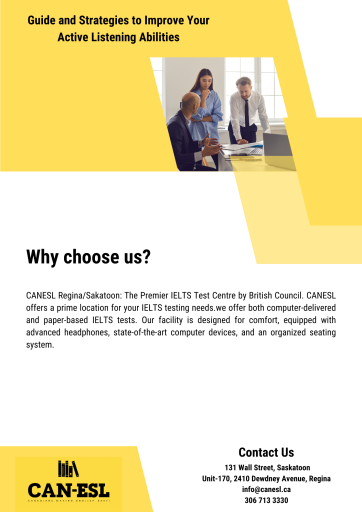

Active listening is a crucial skill for understanding context, providing accurate responses, and being assertive, especially during exams like the IELTS. This ability is equally valuable in personal, professional, and academic settings. In this guide, we present strategies to sharpen your active listening skills, particularly for IELTS preparation.
What is Active Listening and Why is it Important?
Active listening involves fully focusing on the speaker, not just hearing their words but also understanding their emotions, thoughts, and the underlying message. Here’s why it’s important:
IELTS Success: Active listening helps capture essential details, identify key information, and respond accurately, leading to higher scores and improved language proficiency.
Daily Life: It enhances interpersonal relationships by fostering empathy and thoughtful responses.
Professional Contexts: It improves your ability to grasp instructions, provide relevant solutions, and contribute to effective teamwork.
Strategies to Enhance Active Listening
Understand the Question Types Familiarize yourself with the IELTS structure. The listening section includes four recordings with different contexts, such as social conversations, academic discussions, and lectures. Knowing what to expect helps you stay focused and attentive.
Strategic Note-Taking During recordings, jot down key words, numbers, and relevant details. Develop shorthand symbols or abbreviations to save time. Review the questions beforehand to identify what to listen for.
Diverse Listening Practice Expose yourself to various English audio sources like podcasts, TED Talks, and news broadcasts. Engaging with different accents, vocabulary, and styles broadens your listening skills.
Expand Your Vocabulary A robust vocabulary aids in understanding spoken English. Regularly learn new words and synonyms to improve comprehension, especially for unfamiliar terms.
Practice Paraphrasing Paraphrasing confirms your understanding of the speaker’s message and keeps you engaged. It also aids memory retention, making it easier to recall information during exams or conversations.
Identify Main Ideas and Details Focus on recognizing the speaker’s purpose and central message. This skill is vital for answering questions effectively, especially when time is limited.
Analyze the Context Pay attention to the speaker’s tone, attitude, and body language to infer meaning, even if you miss specific words. This approach is applicable both in exams and real-life interactions.
Stay Fully Present Avoid distractions by staying relaxed and focused on the present moment. Techniques like mindfulness or deep breathing can help manage anxiety and enhance concentration.
Seek Constructive Feedback Practice with a study partner or tutor who can provide insights and identify areas for improvement.
Use Audio Scripts Reviewing audio scripts reinforces understanding, helps verify answers, and aids vocabulary expansion. Study how native speakers express ideas to become more attuned to English language patterns.
Conclusion
With these strategies, you can improve your active listening skills not only for the IELTS but also for fostering empathy and understanding in everyday conversations.